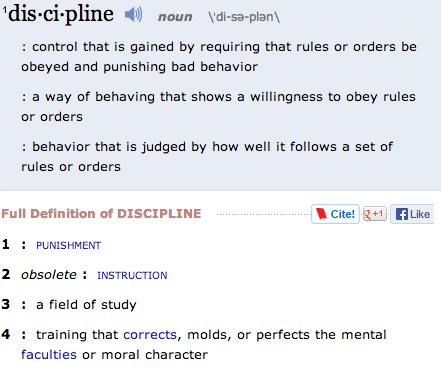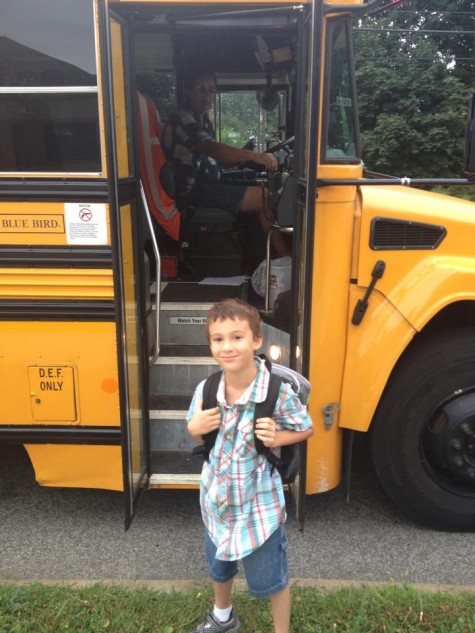Discipline and Punishment in the Second Grade
I thought I knew what discipline meant. The Latin root is disciplina which encompasses education, training and order. Tufts says that disciplina is instruction, tuition, teaching, training, and education and I’d always known discipline to be a benign word, positive even as it relates to children and education. Unfortunately I was wrong. You see, when I look it up at Webster’s the first definition is that discipline and punishment are synonymous and that “instruction” as a synonym to discipline is now obsolete.

Academia needs to either reclaim the obsolete use of the word discipline or jettison it altogether in the lower grades. I cannot see a scenario where second grade teachers would need to punish children for academic infractions in order to have them learn.
Second grade is a tricky year and it’s an important year (as they all can be) to have a skilled teacher. Developmentally 7 year olds are wiggly creatures who are only just beginning to really organize their thoughts. They are boastful and self centered and if you criticize them they have a tendency to shut down. Seven year old children need to be gifted with opportunities to succeed in the classroom so that they may continue to love school and learning.
On my Facebook timeline I see two mothers with second grade children who are constantly missing recess due to missing homework or being made to run laps. I can’t even address the inappropriateness of homework before the third grade. Entire books have been written on the subject and we would be wise to pay attention to academics like Afie Kohn who remind us that there is no evidence that homework has any academic benefit in elementary or middle school.
Let’s ignore all of the research, sigh deeply and recognize the fact that we are in America and American education equates more work with more learning regardless of research to the contrary. This means homework will be piled on as early as Pre-K. My son had Pre-K homework and absolutely loved it. My son is the child that American schools were designed for, he is a lucky boy. Most children don’t enjoy homework. Homework robs children of valuable daylight hours where they can play and learn from experience rather than from books. Again, that’s a soapbox for another day.
Here we are in a situation where a seven year old child has homework. In addition to bringing home and then completing said homework the child is then supposed to get it into their backpack, bring it to school and deliver it to the teacher. My 15 year old sometimes has difficulty with that. When a seven year old child forgets to bring home, do their homework, put their homework in their folder, put their folder in their backpack or take the homework out of the folder and give it to their teacher what’s a teacher to do? Some teachers withhold recess. Other teachers make the children run laps.
If you are a principal, head of school, headmaster or on a board of directors I’d like to ask you to fire all your teachers who take away recess from children or punish children with running. I’m not saying this to be inflammatory or provocative, I am saying this because I love children, I love education and I love getting good teachers in classrooms.
If you are a parent who has a child who is being punished with exercise, punishment can include being forced to exercise or the witholding of exercise, there is an important document you should print out and present to your head of school or board of education. The American Alliance for Health, Physical Education, Recreation and Dance (AAHPERD) released a position statement in 2009 that should be required reading for all. It includes statements such as:
Administering or withholding physical activity as a form of punishment and/or behavior
management is an inappropriate practice.AND
Examples of the inappropriate use of physical activity include:
• Withholding physical education class or recess time for students to complete unfinished
school work or as a consequence for misbehavior.
• Forcing students to run laps or perform push-ups because of behavioral infractions (e.g.,
showing up late, talking, and disruptive behavior).
• Threatening students with physical activity or no physical activity (e.g., no recess, no
game time), and then removing the threat because of good behavior.
• Making students run for losingAND
Exercise used as punishment is considered a form of corporal punishment in many states (e.g.,
California, Massachusetts, and Hawaii). Corporal punishment in schools is illegal in 29 states
(Dupper & Dingus, 2008) and is defined as “physical pain inflicted on the body of a child as a
penalty for disapproved behavior” (National Coalition to Abolish Corporal Punishment in School,
2006). Furthermore, many national professional organizations, including the American
Academy of Pediatrics, the National Association for State Boards of Education, the National
Education Association and the Centers for Disease Control and Prevention (Dupper & Dingus,
2008) have advocated for bans on corporal punishment. State boards of education in Hawaii
and California prohibit withholding physical activity or using it as punishment.
Some of this is easier if you live in Hawaii or California because our states mandate that our children are given time to move their bodies. Here is a database maintained by the National Association of State Boards of Education which may help you find information about your home state. Even without regulation we have to ask ourselves if we can look at a child that’s this age:

ask them to complete complicated, multi-step tasks and then when they fail to meet expectations punish them either with exercise or with confinement. You don’t need an advanced degree to know that’s wrong.
Photo credit MamaSick.com
UPDATE: I need to add that the only reason I feel free to post about this particular issue is because it isn’t an issue at my child’s school. And yes, I love that place, and no, you cannot know where it is. Yes, after Alexander leaves in two years I’ll update this again so y’all can send your kids somewhere in LA where kids are educated and respected.